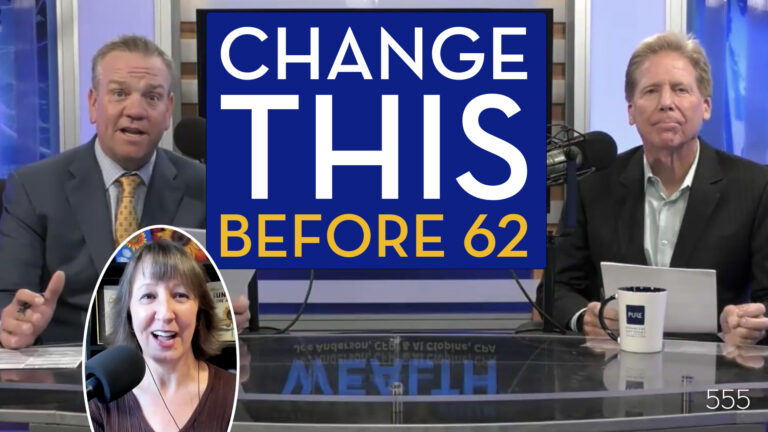In episode 11 of the YMYW podcast, Joe and Al discuss how retirement planning can help you avoid risks and keep you out of a retirement savings crisis. Find out if you should take advantage of these soon-to-disappear Social Security claiming strategies.
3:56 “Waiting for triggers in the overall market for you to make decisions financially is not the right move; you have to get your strategy in place now”
8:37 “Things have got to change and you really need to put things in perspective and start planning as soon as you possibly can”
10:32 “When it comes to these new [Social Security] rules, you have to act now. Let me explain what they are—there are two benefits that are going away”
13:14 “If you turned 62 years of age by 12/31/15, you still qualify to take that restricted application. You can take it on an ex-spouse as long as you were married to that ex-spouse for ten years, or if you are currently married”
18:06 “File and suspend is going away and you’ve got until April 28 to do this”
22:41 ““If you’re married, it’s a really good idea for the spouse who has the highest benefit to wait as long as they can, hopefully to age 70. Why is that? First of all, while you’re both living, you’ll enjoy that higher benefit, and when one of you passes (let’s say the higher wage earner passes), then the spouse will get the survivor benefit which is equal to the same as the spouse that passed away”
34:18 “Tapping your retirement nest egg comes with all sorts of new rules and opportunities. Instead of contributing to tax-deferred accounts that reduce your taxes, you’ll start tapping those savings for income and paying taxes at your regular rate—unless you’re tapping into a Roth IRA, which we want you to be thinking about right now”
Listen to the YMYW podcast:

Amazon Music
AntennaPod
Anytime Player
Apple Podcasts
Audible
Castbox
Castro
Curiocaster
Fountain
Goodpods
iHeartRadio
iVoox
Luminary
Overcast
Player FM
Pocket Casts
Podbean
Podcast Addict
Podcast Index
Podcast Guru
Podcast Republic
Podchaser
Podfriend
PodHero
podStation
Podverse
Podvine
Radio Public
Rephonic
Sonnet
Spotify
Subscribe on Android
Subscribe by Email
RSS feed

YouTube Music
IMPORTANT DISCLOSURES:
Pure Financial Advisors is a registered investment advisor. This show does not intend to provide personalized investment advice through this broadcast and does not represent that the securities or services discussed are suitable for any investor. Investors are advised not to rely on any information contained in the broadcast in the process of making a full and informed investment decision.
• Investment Advisory and Financial Planning Services are offered through Pure Financial Advisors, LLC, a Registered Investment Advisor.
• Pure Financial Advisors LLC does not offer tax or legal advice. Consult with your tax advisor or attorney regarding specific situations.
• Opinions expressed are not intended as investment advice or to predict future performance.
• Past performance does not guarantee future results.
• Investing involves risk including the potential loss of principal. No investment strategy can guarantee a profit or protect against loss in periods of declining values.
• All information is believed to be from reliable sources; however, we make no representation as to its completeness or accuracy.
• Intended for educational purposes only and are not intended as individualized advice or a guarantee that you will achieve a desired result. Before implementing any strategies discussed you should consult your tax and financial advisors.
CFP® – The CERTIFIED FINANCIAL PLANNER™ certification is by the Certified Financial Planner Board of Standards, Inc. To attain the right to use the CFP® designation, an individual must satisfactorily fulfill education, experience and ethics requirements as well as pass a comprehensive exam. Thirty hours of continuing education is required every two years to maintain the designation.
AIF® – Accredited Investment Fiduciary designation is administered by the Center for Fiduciary Studies fi360. To receive the AIF Designation, an individual must meet prerequisite criteria, complete a training program, and pass a comprehensive examination. Six hours of continuing education is required annually to maintain the designation.
CPA – Certified Public Accountant is a license set by the American Institute of Certified Public Accountants and administered by the National Association of State Boards of Accountancy. Eligibility to sit for the Uniform CPA Exam is determined by individual State Boards of Accountancy. Typically, the requirement is a U.S. bachelor’s degree which includes a minimum number of qualifying credit hours in accounting and business administration with an additional one-year study. All CPA candidates must pass the Uniform CPA Examination to qualify for a CPA certificate and license (i.e., permit to practice) to practice public accounting. CPAs are required to take continuing education courses to renew their license, and most states require CPAs to complete an ethics course during every renewal period.









